Kate Douglass Has Built A Special Legacy At UVA … And There’s More to Come
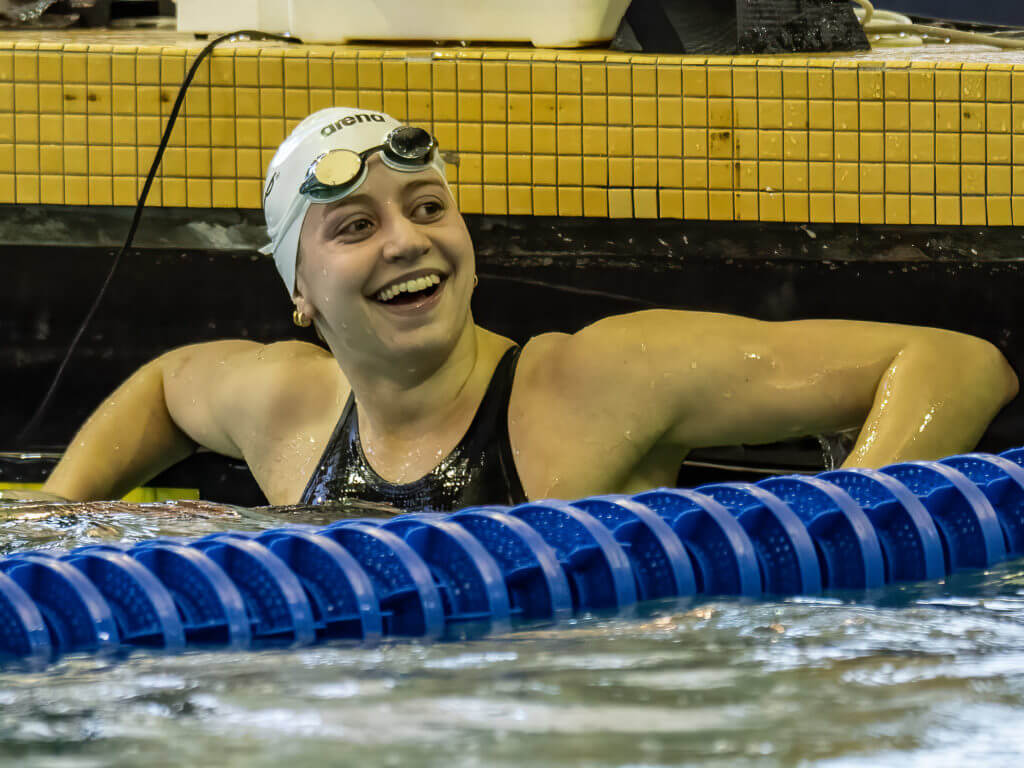
Kate Douglass Has Built A Special Legacy At UVA … And There’s More to Come
Besides the statistics that make the University of Virginia’s Kate Douglass one of the all-time greats in program history, the eight-time NCAA champion and Olympic/World Championship medalist is mindful of the legacy she will leave behind with the Cavaliers.
Kate Douglass had already finished in the most heartbreaking position of all, third place, at the U.S. Olympic Trials. Sure, there had been little expectation of Douglass qualifying for the U.S. team in the 100 butterfly, but she cut almost 9-tenths from her best time in two days to come oh-so-close to runner-up Claire Curzan, ending up just 13-hundredths away from achieving the Olympic dream.
Of course, Douglass’ best shot at securing a place in Tokyo had always been in the 200 IM, but as the meters ticked away in that final, Douglass was on the verge of missing out.
In first place was Alex Walsh, Douglass’ teammate at the University of Virginia and a close friend, while veteran Madisyn Cox was in second place and trying to break through to the Olympic stage for the first time. With 50 meters to go, Douglass was three-quarters of a second behind, and even as the swimmers hit the flags, Cox was still maintaining an arm-length lead over Douglass.
But somehow, in a blanket finish, Douglass got to the wall .02 behind Walsh, but a critical .02 ahead of Cox.
“Making the Olympics is one thing, but making it next to one of your best friends and your training partner, it’s just an amazing feeling, and I can’t even describe it,” Douglass said that night. “I definitely saw that it was a race to the finish at the end there in the freestyle. My body was starting to give out, but once I hit the 15-meter mark, I just put my head down and tried to get into the wall as fast as I could.”
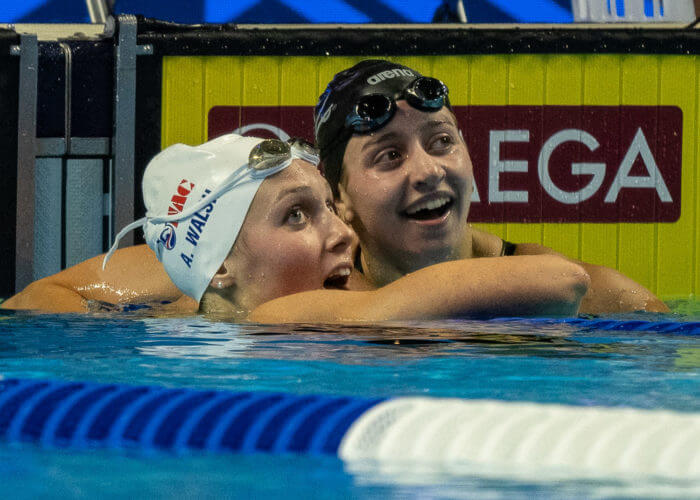
Photo Courtesy: Peter H. Bick
Six weeks later, Douglass secured her first Olympic medal, a bronze in the 200 IM, while Walsh won silver. Douglass swam a time of 2:09.04 to become one of the top 20 performers in history in the event. Back in Charlottesville, Va., a video of the duo’s Virginia teammates watching the race and celebrating the swimmers’ success went viral.
The medley had been the event where Douglass became an Olympian and achieved the greatest success of her career to that point, even at only 19 years old. But less than a year later as the United States was selecting its World Championships team, the second-to-last heat of the 200 IM walked to the blocks, and Douglass was not there. Not because she was sick or unavailable or even trying to avoid a showdown with Walsh in the event.
“We’re not really super competitive with each other in a negative way,” Douglass said of competing against Walsh. “We push each other and practice to be better, and I think that’s a good thing, but even at Olympic Trials, that wasn’t really ever an issue, us competing against each other.”
No, Douglass skipped the 200 IM at the International Team Trials because she could—because she is so talented in so many different events that she could say to the one that made her an Olympian, ‘Nah, I’m good.”
NCAA CHAMPIONSHIP HISTORY-MAKING
It was about one month before that selection meet no-show that Douglass painted a clear picture of her versatility with a performance over four days at the NCAA Championships in Atlanta that placed her into historic territory: She joined an exclusive club of swimmers to hold records in three different strokes, joining the likes of Tracy Caulkins and Natalie Coughlin.
First, Douglass swam the fastest time in history in the 50 yard freestyle, getting underneath Abbey Weitzeil’s previous mark of 20.90 with a time of 20.84. A day later, Douglass won the 100 butterfly in a tight finish ahead of Torri Huske (the fourth-place finisher in the 100 meter fly at the Olympics and American record holder in long course) and Maggie Mac Neil (the Tokyo gold medalist). In the process, she broke Curzan’s month-old American record in the event with a mark of 49.04. Finally, Douglass was dominant in the 200 breaststroke, and in the process, she swam a mark of 2:02.19 to beat the American and U.S. Open record belonging to Lilly King by a half-second.
To recap, a swimmer best known for her abilities in the individual medley surpassed the best-ever marks in three wildly different events, beating out marks set by pure specialists in the process.
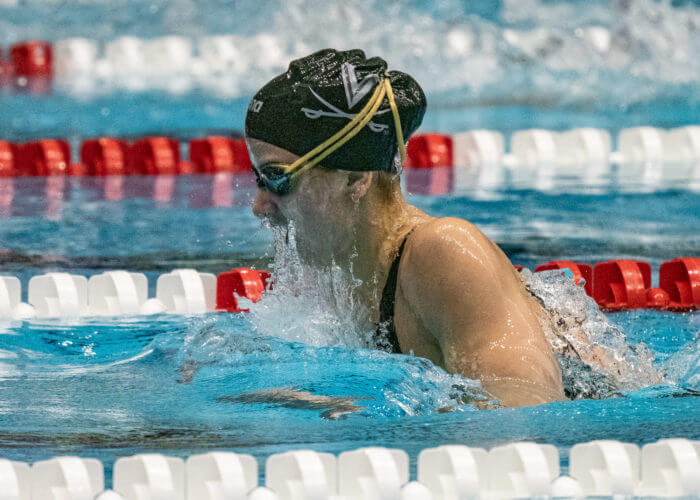
Photo Courtesy: Peter H. Bick
“I guess that was something that (Virginia head coach) Todd (DeSorbo) always told me I could do, and I never really fully believed that it was going to happen,” Douglass said of breaking the wide-ranging records. “There was a point where last year at the start of the season when I sat down with Todd and we talked about my goals. I did tell him that I wanted to break the American record in the 50 free and the 200 breast because I was starting to feel like that was something that I really could do.
“That was what I was working toward for the whole season, breaking those two records, but it was also something in the back of my mind where I was still like, ‘I don’t know if this is going to happen or not.’ It was definitely a big shock when I did that.”
While in the midst of her record spree, Douglass led Virginia to wins in four different relays, breaking American records in all four at the ACC Championships and/or NCAA Championships, and she was one of the primary forces behind the Cavaliers’ 145.5-point drubbing of their competition for a second-consecutive national title.
“My NCAAs last season was very shocking, and altogether, I was kind of left speechless because I never thought… The year prior, I had only won the 50 free, and I was second place in everything else,” Douglass said. “My goal last season was to maybe try to win two events, but coming back with seven first-places, I was just kind of in shock.”
THE KEYS TO SUSTAINED SUCCESS
After more than three years working together, the bonds of trust run deep between Douglass and DeSorbo, who was the head women’s coach for the U.S. at this summer’s World Championships. That trust is obvious simply by following Douglass’ results in competition, but her words reaffirm her belief in DeSorbo’s approach to swimming.
Over the last year, that meant Douglass following closely a training program designed to help her succeed in events as wide-ranging as a 50 free and 200 breast.
“That always kind of stresses me out,” Douglass said. “At the beginning of the season, Todd’s always asking me what events I want to focus on, and I’m always like, ‘How am I going to be able to train for all these events?’ And he’s like, ‘You’ve just got to trust me, and it will work itself out.’”
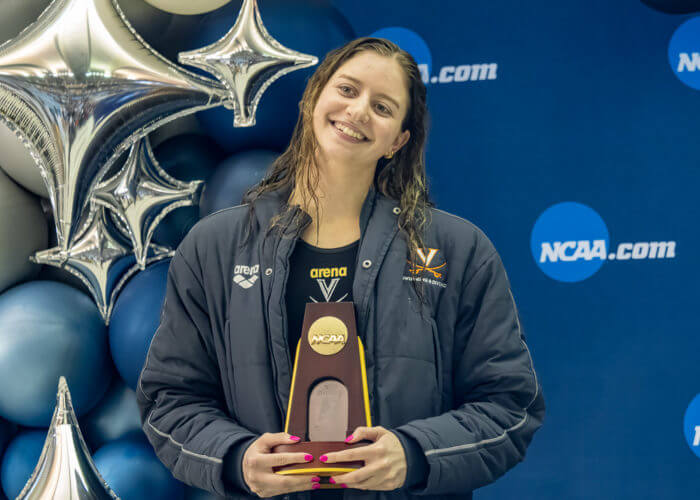
Photo Courtesy: Peter H. Bick
The routine of balancing all of those different event commitments is grueling, but also refreshing mentally. For instance, during the 2021-22 collegiate season, Douglass would complete practices focusing on the 50 free twice a week, 200 breast practices twice a week, another two practices focusing on 100-yard events (with eyes on free, fly and breast) and then at least one aerobic freestyle workout. “Those are rough for me,” Douglass said, a sentiment that most sprinters will undoubtedly agree with.
After the college season finished and Douglass had a brief moment to collect her thoughts on such a successful four days, the attention quickly turned to the U.S. selection meet for the World Championships, and Douglass decided she wanted to go all-in on the 100 free and 200 breast. The two-lap freestyle race would offer a good chance to qualify for the World Championships as a relay swimmer, but the 200 breast meant a showdown with two swimmers who were returning medalists in the event from the Tokyo Games, King and Annie Lazor. Douglass would have to crash the expected King-Lazor party, but after breaking King’s short course record, it was clear that she was coming for the favorites.
On Day 1 of Trials, Douglass took fifth in the 100 free, most likely earning a spot at Worlds, and a day later, she made it official as she grabbed second in the 200 breast, a half-second ahead of Lazor and with a time (2:21.43) quick enough to make her the fourth-fastest American in history.
And as soon as she was officially on the team, Douglass knew she was not swimming the 200 IM. She said that not officially scratching and instead simply not showing up for her prelims race was “Todd’s idea, not mine.” Douglass still sees a future for herself in the 200 IM, but given the timing and the strength of her other events, she felt that a hiatus was in her best interest.
“After the Olympics, I kind of wanted to take a break from it. That event gave me a lot of anxiety and stress to train,” Douglass said. “I think Todd and I are still kind of working through why—probably because of the pressure leading up to Olympic Trials and the Olympics. After that, I just didn’t really want to swim it short course. I wanted to focus on other things. When it came time for long course season, I didn’t really want to focus on that.”
INTERNATIONAL RETURN AND THE FUTURE
The medley was out of mind at the Budapest World Championships in June, but Douglass recorded a successful second trip to the major international stage as she collected a trio of bronze medals. She swam as part of the U.S. women’s 400 free relay in both prelims and finals, and then she earned an individual medal in a very close 200 breast final. The last medal came for Douglass’ role as a prelims relay swimmer for the Americans’ mixed 400 free relay.
It was a very different situation for Douglass from the college championship meet three months earlier that had included 10 races over four days, numerous records and a hard-earned team trophy, but this one carried special significance for Douglass as well—collecting more experience on the highest level of the sport and getting to be teammates with friends who trained elsewhere but have traveled the world together for years.
“It definitely felt like more of a chill experience for me just because I had already been to the Olympics,” Douglass said of Worlds. “I experienced something like that before, and I already knew most of the coaches, and I knew most of the people on the team already, so it’s not like I felt like I was out of place or anything.
“I really just wanted to make it for fun, and I didn’t swim the 200 IM, so obviously I wasn’t trying to swim every event that I could there and try to medal a bunch. I just wanted to go for the experience.
“I just love those meets because I get to spend a lot of time with people that I don’t get to see very often, and so it was nice to be with the good group of girls that I’ve known for a while.”
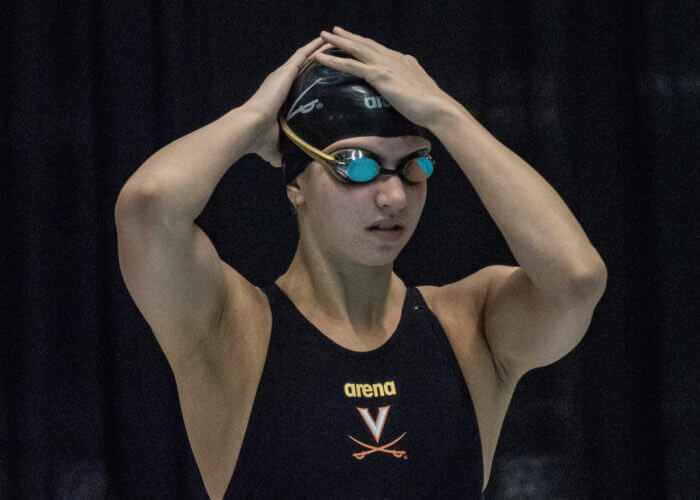
Photo Courtesy: Peter H. Bick
After Worlds came a break, a stretch of nearly two months where Douglass did not touch the pool and hardly worked out at all. Douglass admitted that “the idea of taking a break scares me,” but she and DeSorbo had agreed that the extended layoff was necessary for both physical and mental recovery, and an early summer World Championships made such a reset possible. “After the summer, we felt like there wasn’t really a time where I could take a big chunk of time off again like that,” Douglass said.
Douglass will turn 21 on Nov. 17, and she is in the midst of her senior college season. She has not made a final decision about whether to swim a fifth year for the college team (allowed under a COVID-19 waiver), but she is leaning toward putting all her attention on long course and Olympic Trials after March 2023.
But for the moment, it’s all about what she can do for the Cavaliers as they pursue a third consecutive national title. “Right now, what motivates me is the college season and NCAAs in March,” Douglass said. “I definitely think I try to take things in small little groups and not think too far in the future.”
Right now, that means intense training to build back up from her break to the peak form that produced three American records and three World Championship bronze medals last year. Just as important for Douglass is the legacy she will leave behind with the Cavaliers: “Now that I’m a Fourth-Year and someone that people look up to on the team, I just want to leave a big impact with the younger kids on the team, especially the First-Years. I want them to look up to me as a role model. I just want to be someone that people look up to.”
Non-Subscribers can click here to download this issue for only $5.94



